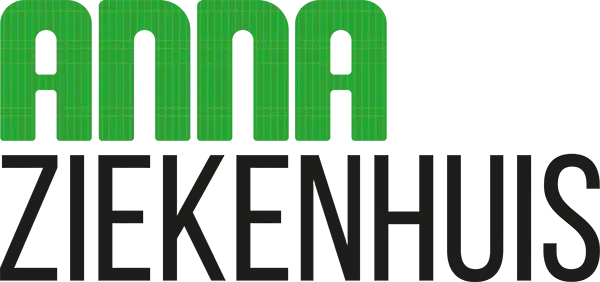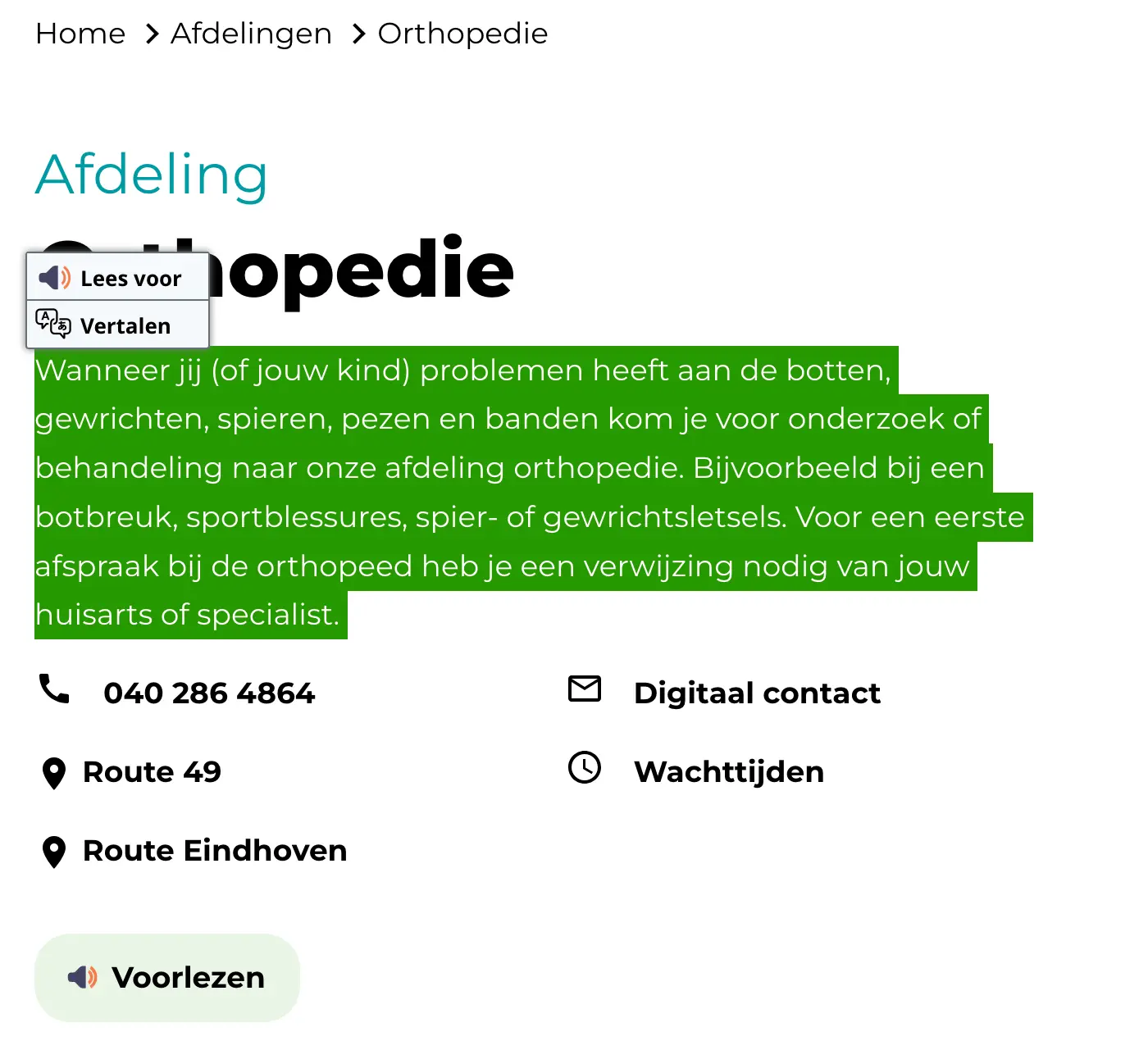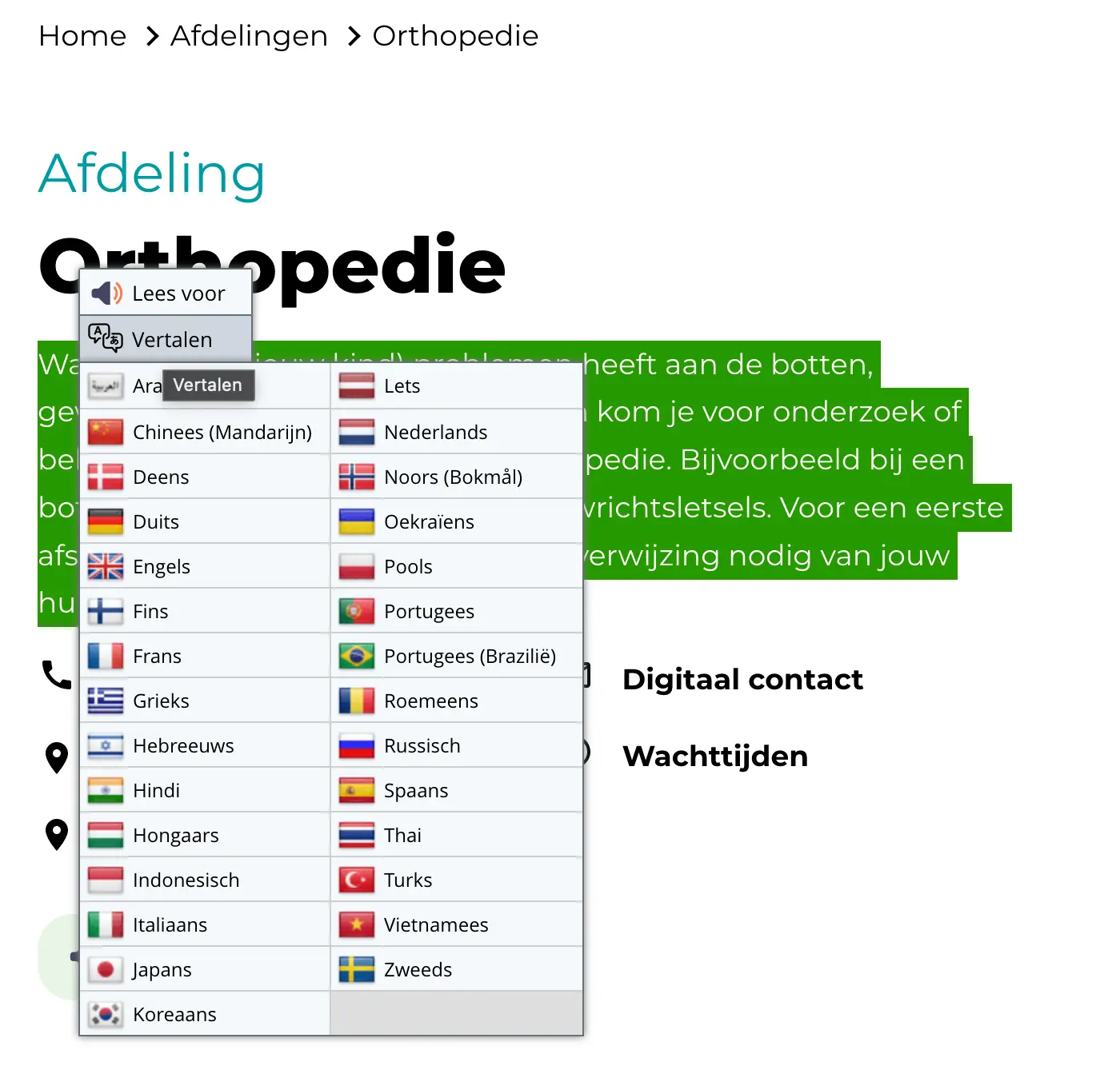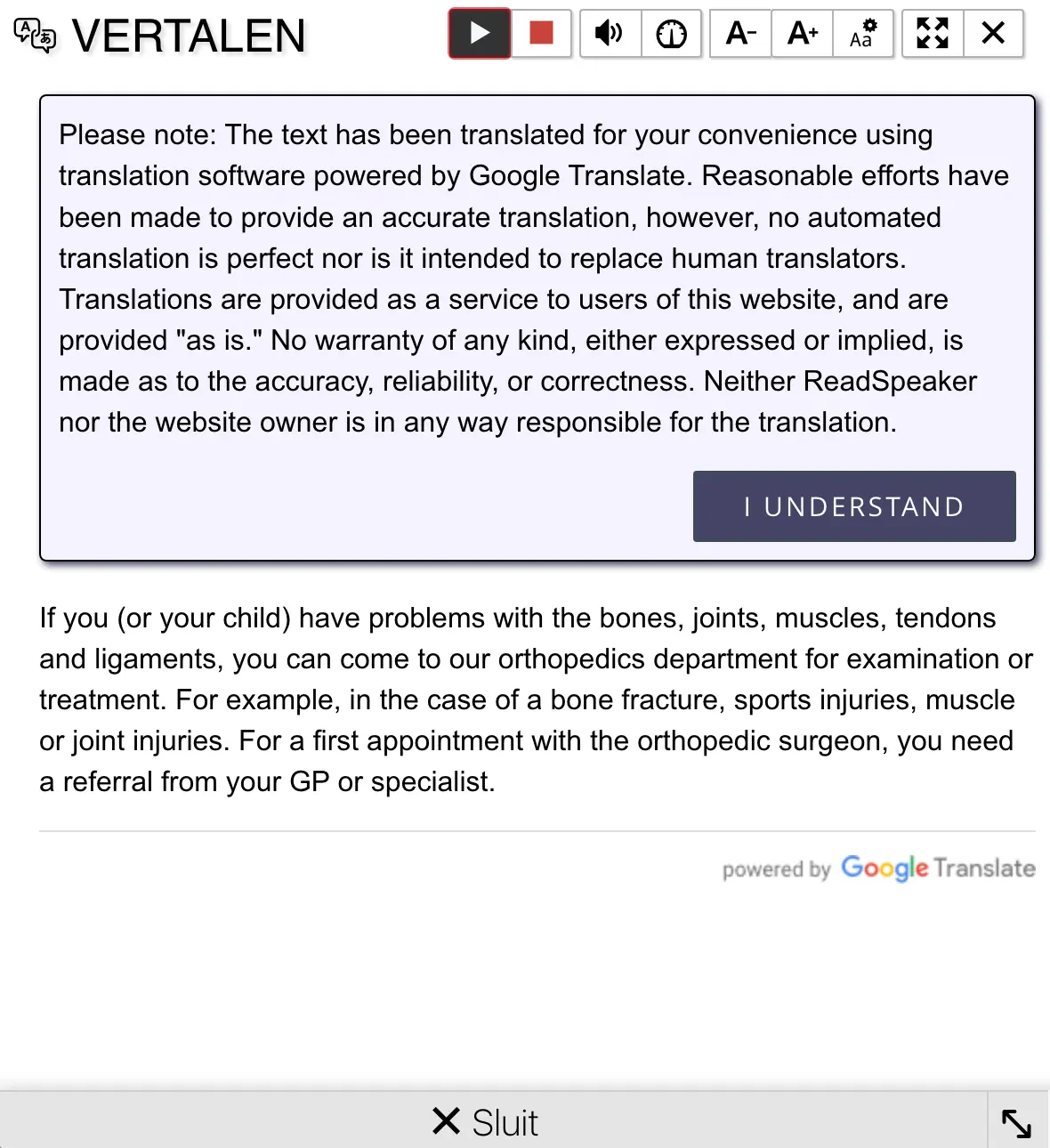Information for admission to Paediatrics for interventions under anaesthesia
Kindergeneeskunde
Admission of your child
Your child is expected for admission on:
__________day, date: __________
You can call for the exact admission time on:
__________day, date: ___________
Admissions date
The Admissions Office will inform you by mail or by phone about your child’s date of admission.
The admissions date given to you is always subject to change. Sometimes the date has to be postponed.
Admissions time
The exact admission time will be known two working days before admission. To find out, call Paediatrics two working days (i.e. not on Sundays or holidays) before admission between 15:00 and 16:00 at 040 - 286 41 70.
The planned admissions time is set; we cannot make modifications to the surgical planning. Thank you for your understanding.
Questions:
- For medical questions, call the outpatient clinic of your child’s treating physician at 040 - 286 40 40.
- For other questions, call the Admissions Office Monday-Friday at 040 - 286 48 10.
- For specific questions about your admission date, call us 9:00-10:00 Monday-Friday at 040 - 286 48 49.
On the day of admission you can report to the reception at the main entrance with your child.
Preparations at home
|
Come on an empty stomach It is extremely important that your child has an empty stomach before the operation.
It is important that your child come with an empty stomach. If that is not the case, food, liquid and stomach acid that is still in the stomach can end up in the lungs during or around the time of the procedure. That can cause severe lung inflammation and respiratory problems. It is therefore essential that your child comply with the empty stomach requirement. IMPORTANT: If your child is required to come on an empty stomach, the instructions listed above must be followed – otherwise the procedure may be cancelled. |
Medication use
If your child takes medications, please bring them all to the hospital on the day of intake. We will coordinate with you which medicines to take and when on the day of the operation.
If you have questions about this, please call Paediatrics at 040 - 286 41 70.
Physical care at home
We ask that, before admission, your child take a shower or be given a bath. On the day of the intervention your child may not wear jewellery, make-up or nail polish. Jewellery is small and can get lost; make-up and nail polish impede a good view of circulation in the skin and nails. If your child has long hair, it would be practical to braid it or tie it in a ponytail that day.
Brief introduction
Your child will soon be admitted to Paediatrics at St. Anna Hospital for a day. An operation or examination under anaesthesia can be a tense event for your child. As no complications are expected after the procedure, normally speaking your child can go home that same day. Occasionally a young patient does have to stay at the hospital for a night, for example in case of fever or persistent nausea. It goes without saying that one of the parents is welcome to stay overnight with the child.
From experience we know that the best way a parent can support their child is by knowing what will be happening. This is why we have included the most important points for you in this folder. For readability’s sake we are using the ‘he/his’ form, so where you read ‘he/his’ it also means ‘she/her’. When we speak about parents, we also mean carers/guardians.
Information for home
Children can generally process a less pleasant experience better if they know in advance what to expect. Because on this day all actions take place within a short period of time, it can feel threatening and/or burdensome for your child. For this reason, it is important that you prepare him well for what will be taking place. In this way your child gets the chance to keep his anxiety under control. You should therefore tell him as simply and as honestly as possible what will be taking place and why.
What you tell your child will depend on his age. Older children usually want to know everything quite precisely. For younger children a short, simple explanation will do. Playing materials (dolls, books, doctor’s case) can help you make your story even clearer.
In any event, you should tell your child:
- Why he has to be operated.
- What will happen on the day of the operation.
- How they will put him under anaesthesia.
- That you will stay with him the whole day.
- That you will also be with him when he is put under anaesthesia and will be sitting next to him when he wakes up from it. If you are uncomfortable with this, perhaps there is another familiar person that can accompany your child through this?
- That your child can feel sick or have pain afterwards, but that he will get medicines for it.
Information video about operations
The preparatory video has been specially created for children, and shows what happens during a day admission and what the hospital looks like, aiming to put the child’s mind at peace. Take your time to look at this video together with your child.
Do not start making preparations too soon, as this can cause unnecessary stress. For most children, a good timeline is to start talking about it a few days before admission. With older children you can certainly start talking about it sooner. Ask your young child to tell the story back to you. In this way you can find out if there is anything he did not understand.
Even children who are well prepared can feel anxiety or put up resistance. Children who are not prepared can end up feeling betrayed and disappointed, especially in their parents, and can remain suspicious for a long time afterwards.
Deze video wordt getoond na het accepteren van cookies
Information at the hospital
You have decided jointly with your specialist for your child to have an operation. To prepare for this operation, which necessitates anaesthesia, an appointment will be made for a preoperative intake interview to discuss the anaesthesia.
Important: Please bring the completed anaesthesia questionnaire to the intake interview.
Preoperative appointment
During the preoperative appointment you will talk with someone from the anaesthesiology staff. They will examine and screen the child, and will perform any necessary tests under the supervision of the anaesthesiologist.
During this screening the anaesthesia questionnaire will be discussed and your consent for anaesthesia will be requested. You and your child can choose between anaesthesia that is either injected or breathed in through a mask. If the anaesthesiologist decides to deviate from the previously made choice anyway, it is always with your child’s safety in mind. After this appointment and after consultation, you may be able to take a peek at the paediatrics ward with your child.
Admission
On the day of admission you can report to the reception at the main entrance of the hospital. To keep things peaceful for all children that will be operated, we recommend that only one adult (or at most two) accompany each child.
Postponement of admission
It can happen that the admission is postponed because on the previous day your child
- had a nose cold and/or was coughing;
- had a fever higher than 38°C;
- had a paediatric disease or may have been infected with one in the last three weeks (mumps, rubella, measles, etc.).
If this is the case, please contact the hospital’s treating physician, who can assess whether the admission can go through.
What to bring
As part of the preparations, you can help your child pack his suitcase or bag.
For your child:
- medicines your child takes;
- stuffed animal, pacifier, favourite toy;
- his own cup or bottle;
- pyjamas;
- slippers or socks;
For yourself:
- something to read or do while waiting;
- a packed lunch. We recommend that, as an accompanying parent, you have a good meal at home beforehand, as you will have an exhausting day ahead of you. You can get coffee and tea at the ward, and can also go to the visitors’ restaurant.
Anaesthesia
If you agreed on anaesthesia by injection, one hour in advance a numbing cream will be applied to your child at the injection site so that he will not (or hardly) feel the injection. If the plan is to give your child anaesthesia through a mask, tell your child in advance that most children think the anaesthetic gas doesn’t smell good!
Being accompanied by a parent before and after the anaesthesia
It can be very comforting for your child that you stay with him until he falls asleep and are sitting next to him when he wakes up. We certainly acknowledge the importance of this, and want to offer one of the parents the opportunity to accompany the child to the operation room and afterwards to the recovery room. A few conditions do apply:
- Respect the privacy of the other patients you see in the recovery room and direct your attention only to your own child.
- You are requested not to bring anything to the operating room or the recovery room; this applies especially to your mobile phone.
- In the interest of other patients, it is essential that you behave calmly.
- For various reasons you may be asked to leave the operation room or the recovery room. Please calmly follow the instructions of the nurse.
- The personnel in the recovery room is there to care for the operated children. They do not always have the time to look after you too. Your presence in the recovery room is your responsibility.
Around the operation
If it is your child’s turn, the paediatric nurse will roll him into the surgery ward in his own bed. Stuffed animals, blankets and pacifiers are allowed.
At the surgery ward you will be in a special waiting area. You will be given an overall to wear over your clothes and a cap to cover your hair. We advise that you put on the overall and cap in the presence of your child, so that he can follow the change in your appearance and will know that you are wearing an odd outfit.
Children are put to sleep mostly in a lying position. You can talk to your child calmly and softly, and hold his hand.
Some children display the following behaviour when falling asleep:
- pulling or hitting with arms and/or legs;
- turning their eyes, sometimes the eyes stay open;
- restlessness;
- paleness;
- coughing or other audible breathing.
Do not be frightened by this, it is normal when children are brought under anaesthesia. Your child will not notice any of it, as he will already be asleep.
As soon as your child is sleeping he will get an infusion to administer fluids and medicines. Once your child is under anaesthesia, a surgical assistant will guide you to the exit of the operating room. You cannot be in the operating room during the surgery, and will be asked to go back to the paediatrics ward.
In case of an emergency operation we try to let the parents be with the child as much as possible, so that they, together with the hospital staff, can explain to the child what is happening and why.
After the operation your child will be brought to the recovery room. You will be called as soon as possible, to be there when he wakes up. The anaesthesiologist decides when your child can go back to the ward. The paediatric nurse will come get you both. Remember that after the procedure your child may be slightly sleepy, restless, confused or angry. He may also feel nauseous and look pale
At the operating room or recovery room your child will get pain medicine. Later on, pain medicine (mostly as suppositories) will be given to your child on a schedule. If your child is still in pain, he (or you) should always communicate this clearly to the paediatric nurse! She can then see if your child can get extra medicines against the pain, or will contact the anaesthesiologist to find out. The infusion stays on for an extended period after the procedure.
Most of the time children can already drink something immediately after the operation. The paediatric nurse will take care of this.
Information after the procedure
If after the intervention you have questions about your child, ask the paediatric nurse. In conformity with privacy regulations, information is only provided to the parents and not to family or friends.
Going home
The time to go home depends on your child’s overall condition. The paediatric nurse has experience assessing this. Please keep in mind that your child (in day treatment) must stay in the nursing ward for at least 2 hours after the treatment.
In a discharge interview you will receive written information about the recommended food, medicines, pain medication and proper treatment. In terms of pain relief you will get specific advice to administer certain analgesics to your child at set times for the first 48 hours after the procedure. In this interview it will also be discussed what you can expect at home and what you should look out for. The written information has the phone number to call in case of an emergency.
Not every procedure necessitates a doctor to see your child before hospital discharge. If you do want to speak to a doctor before leaving the hospital, the best way to go about it is via the paediatric nurse.
If applicable, you will take home an appointment card with the day and time of the outpatient follow-up.
Back at home
Once back at home, your child may behave differently than what you are used to from him. He may be sleeping poorly or be more clingy, angry or actually very quiet, irritable or restless. Fortunately such behaviour does not last for long. Give your child some extra attention! Talking together about everything that has happened in such a short period of time can help process it.
If you still have questions after going back home, you can always contact Paediatrics directly by calling 040 - 286 41 70.
General
Liability
The hospital is not liable for damage, loss or theft of your property or toys of your children. Do not bring too much money or expensive things with you.
Information and consent
Legally, every patient – therefore also your child – has a right to clear information about:
- his disease or condition and its consequences
- the possible examinations and treatments, and the side effects and risks of an examination or treatment
- any other treatment options
The doctor will discuss with you which tests he considers necessary for your child. If the information is not clear, ask for further explanation, as in fact the doctor is only making a proposal you as a parent will have to consent to.
- age <12 years: Children younger than 12 do have to receive understandable information, but it is the parents who give consent for the treatment.
- age 12-16 years: After being given information, a child between ages 12 and 16 gives consent together with his parents. If his opinion differs from that of his parents, after intensive consultation the opinion of the child takes priority over that of the parents.
- age >16 years: Children over 16 decide on their treatment themselves.
Privacy and access to patient records
St Anna Hospital has regulations protecting patient privacy. The hospital is required to comply with these regulations. The doctor treating your child will write down his information in the medical records. You can access these records after requesting them from the doctor. Nurses write down their findings in the nursing record which is in your child’s room and which the parents can look at there.
Complaints
If you are not satisfied with how things went or with your child’s treatment, please let us know. This will enable us to improve our care. It is best to first discuss your complaint with those directly involved, but if you find this difficult or if this communication did not go satisfactorily, you can always approach the complaints mediation department of St Anna Hospital.
Information of the complaints regulations is available from the nurse or via our website.
Mobile phone
You can use your mobile phone in the hospital room, but you cannot bring it to the operating room or the recovery room.
In closing
We hope to have informed you satisfactorily with this folder. If you have other questions, you can always call Paediatrics at 040 - 286 41 70.



